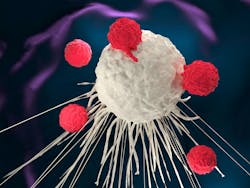Axicabtagene ciloleucel, commonly known as axi-cel, is an innovative immunotherapy that uses modified T cells to target and destroy cancer cells.
Approved for patients who have not responded to at least two prior lines of therapy, axicabtagene ciloleucel has been a game-changer in treating large B-cell lymphoma. While initial studies demonstrated promising short-term results, long-term survivorship data has been scarce. However, a new study published in the Journal of Clinical Oncology provides that long-term perspective.
The study, led by Moffitt Cancer Center in conjunction with a consortium of 16 other U.S. academic cancer centers, followed 275 patients who received axicabtagene ciloleucel therapy, tracking their progress over a median period of 58 months. The results demonstrated that 29% of patients experienced progression-free survival at five years, and 40% achieved overall survival at the same milestone. The five-year lymphoma-specific survival rate was 53%, indicating that many patients remained cancer free. These findings align with earlier clinical trials, highlighting the real-world effectiveness of axi-cel.
However, the study also identified important survivorship issues. The five-year nonrelapse mortality rate was 16.2%, with over half of these deaths occurring beyond two years post-treatment. The primary causes of late nonrelapse mortality were infections and subsequent malignant neoplasms, such as therapy-related myeloid neoplasms and solid tumors. Notably, patients over 60 had a higher risk of nonrelapse mortality compared to their younger counterparts.
Between six months and two years post-treatment, nearly a quarter of patients experienced infections, with severe cases requiring hospitalization or intravenous antibiotics. Additionally, prolonged neutropenia and other cytopenias were common, further contributing to the risk of infections.

